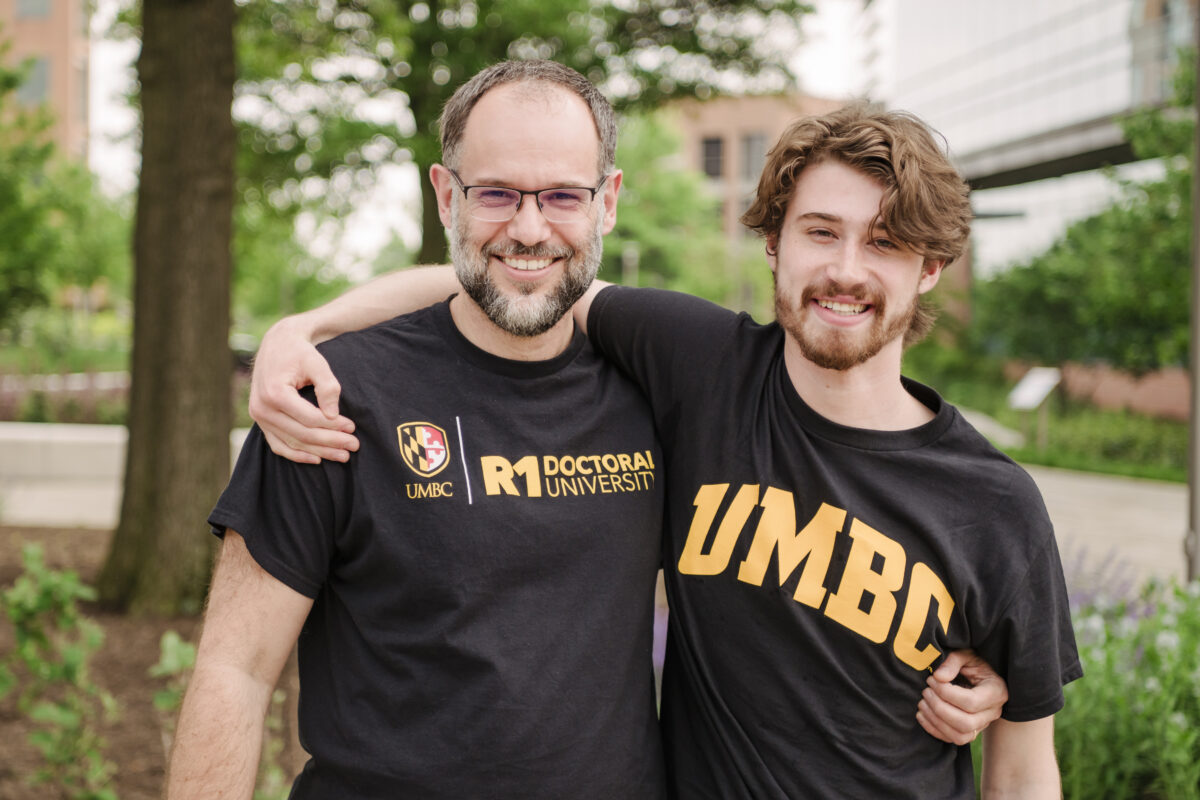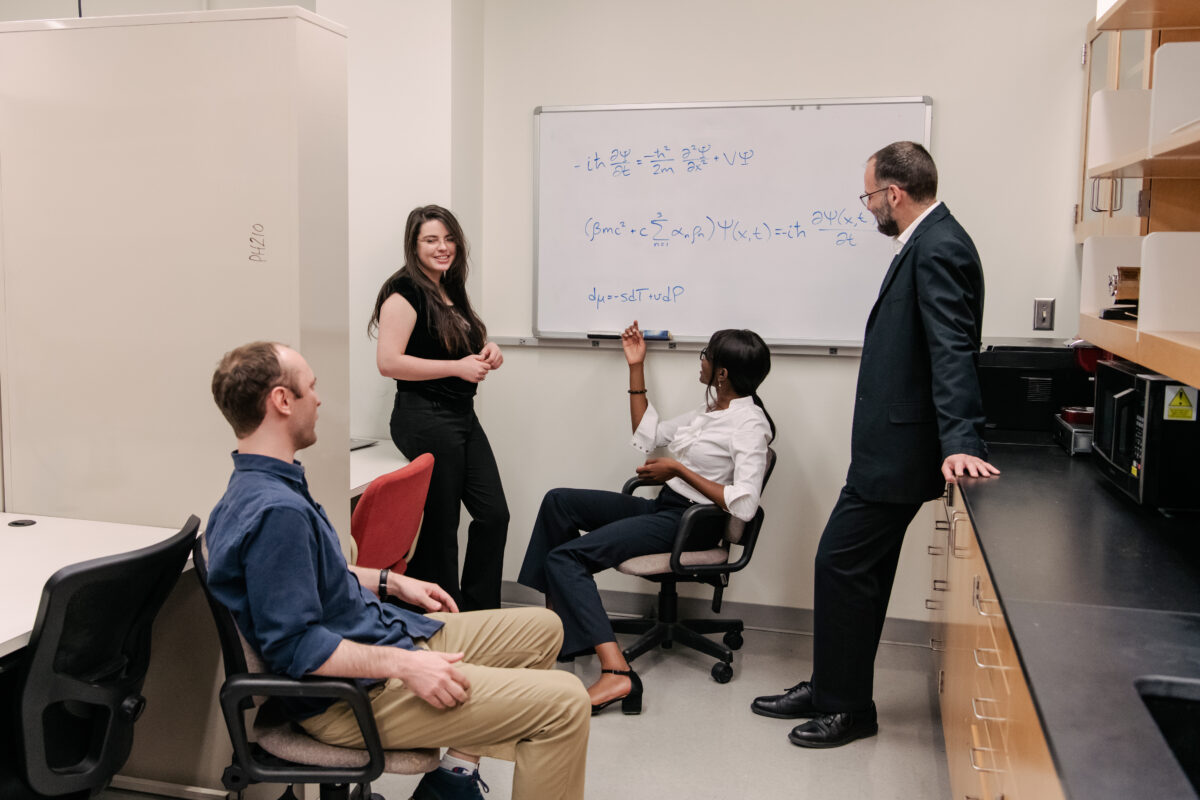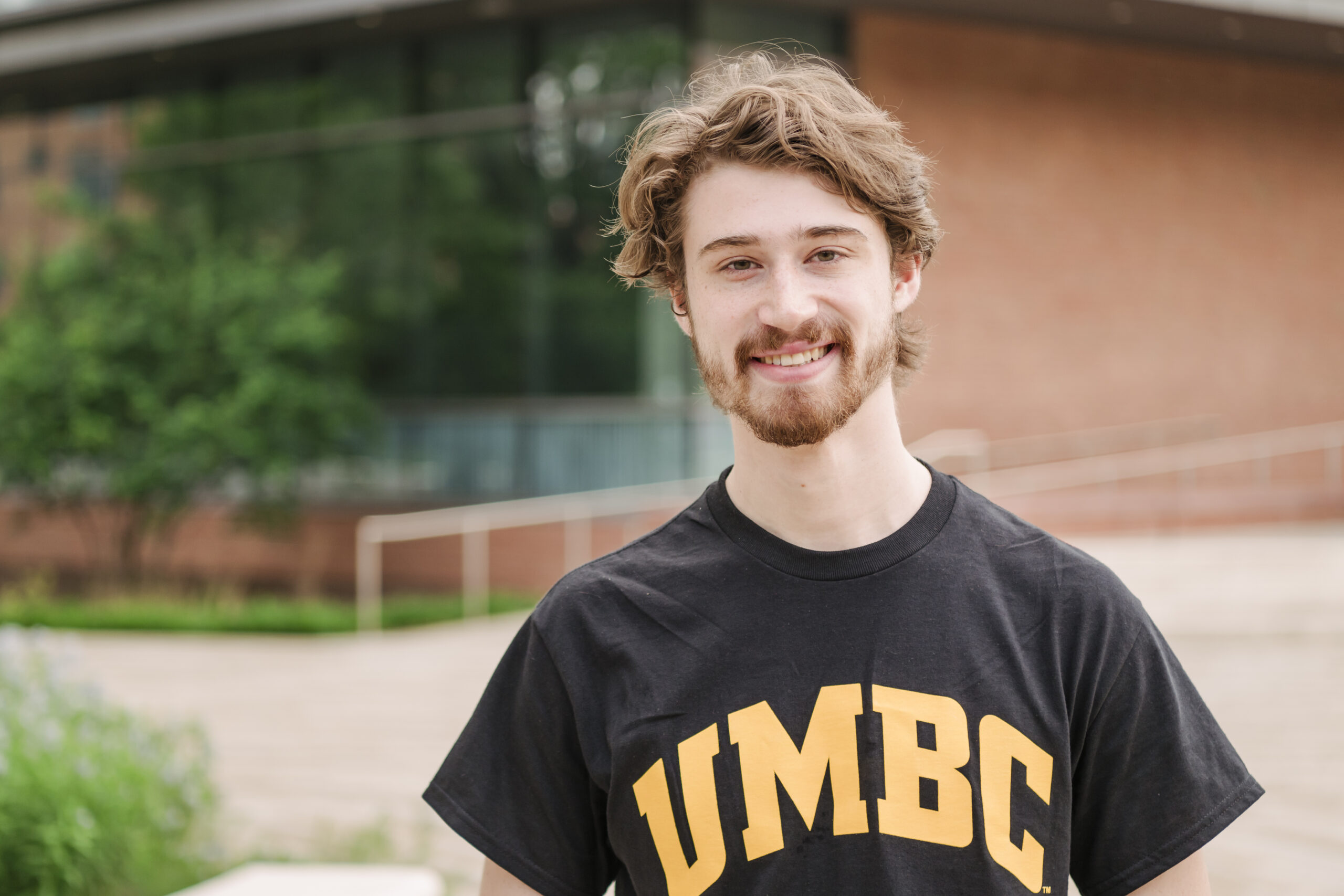Maxfield Hartley ’24, physics, is an “exceptionally talented student with a truly inquisitive mind,” according to his mentor, Associate Professor Sebastian Deffner. Max’s undergraduate research applying thermodynamic principles to music bends the mind, but leaves one wanting to know more—and his enthusiasm is contagious. Later this summer, Max is headed to an interdisciplinary and international doctoral program at the Okinawa Institute of Science and Technology in Okinawa, Japan.
Q: How did you connect with your mentor, physics professor Sebastian Deffner?
A: I took his thermodynamics class. It was one of the most interesting classes I’ve taken. I had been told that it was the hardest class in the physics major, and I just asked a ton of questions. Sometimes after class, I would have more questions, so I would follow him to his office and then to the dining hall—that was just how many questions I had. Over lunch, we’d talk about physics, or we’d talk about careers—because at this point I wasn’t really sure I wanted to be a physicist.
One of the things that made me feel more comfortable doing this was that in the second week of the semester he asked me to come to his office after class. And I was like, “Oh no. What have I done? He’s going to give me a talking to.” Which made what happened even more surprising. I sat down across from him and he said, “Max, you’re a very talented student.” And I said, “Thank you!” And he said, “No, it’s not a compliment, just an observation,” in the most German way you can possibly imagine.
It meant a lot. So even though I wasn’t necessarily awash in my own self-generated confidence, having him say that made me think, “Well, maybe he’s right. Maybe there’s something to this.” So I felt more confident after that. It was a big moment for me.
Then, I officially joined Dr. Deffner’s research group and got started on a really interesting project.

Q: Tell me about the project.
A: It’s essentially a data analysis project, where we apply an analysis that is usually reserved for physical particle trajectories to musical melodies. In the same way that the particle trajectory is a series of positions, we think of a melody as a series of pitches.
Our central quantity is the entropy, which increases in an irreversible physical process. Irreversible means that it is vanishingly unlikely for the process to happen in reverse. In our analysis of music, we are interested in seeing if the “musical entropy” that we calculate increases over time, indicating irreversibility or directionality in music.
In general, I have always been interested in creating objectively defined quantities that can be used to analyze why music sounds the way it does to us. The possibility of creating a modern music theory which borrows ideas from thermodynamics is very cool to me. Then, we would be able to describe certain sounds as “hotter,” “colder,” “higher energy,” or “more entropic.” We could also go the other way, thinking of certain thermodynamic processes as more “consonant” or “dissonant.”
From our results so far, it looks like overall music does have some level of irreversible directionality that is similar to what we see in thermodynamics. We’re running some additional analyses now, such as controlling for the music’s key signature and comparing the results from music in different genres, and then we plan to submit our findings to a physics journal.
Q: How has Deffner supported you and your growth as a researcher?
A: Dr. Deffner has pushed me to have experiences in the physics department I might not have otherwise had. For example, he recruited me to volunteer with the Science Olympiad held for high school students at UMBC, and that experience was quite rewarding and fun. Dr. Deffner also answers all of the random physics questions I come up with, and he has assigned his postdoc, Emery Doucet, to help me with my project. I’ve had many useful conversations with Emery, and his generous guidance has helped me understand a lot better how to organize and scope a research project.

Q: What advice would you give to someone who’s uncertain about their major?
A: First, it’s hard to make big decisions. That’s what I struggle with. So I actually came into UMBC undeclared. I knew I wanted to do something in STEM, and I took as many classes as I could that would apply to all of the majors related to my wide-ranging interests.
I was considering computer science or computer engineering, and in my sophomore year, I sat down with my mom and told her I needed to decide what I wanted to do. I looked at physics, and everything—from the introductory courses to the 400-level classes—looked really cool. And I thought, well, that’s a good sign. Decision-making is still something I find difficult, though. Ask me about that one when I’m older!
My best advice for getting inspired is to knock on people’s doors and talk to them! Find a professor who’s studying something you think you’d possibly be interested in and have a conversation. Most professors will be quite happy to do this. Also, ask a lot of questions in class! It’s difficult, because the more questions you ask, the more chances you have to come off as a fool, but my advice is to embrace the experience of coming off as a fool. Over time it won’t bother you as much. Also, a majority of the time you’ll actually ask a question that somebody else was wondering about.
Q: Now that you’ve chosen physics, what would you say drives your passion for it?
A: First, I find thermodynamics in general interesting because it is more of an approach to physics than simply a branch of physics. In thermodynamics, we’re modeling a system about which we only have macroscopic information. The actual microscopic dynamics of the many molecules in a glass of water are incredibly complicated, but we cannot directly observe them, and we don’t actually care all that much.
Instead, we model properties we can observe, like heat and work, and we can still learn a lot about the glass of water. We dump everything we don’t know about what’s happening at the microscopic level into one variable, which we call the entropy. This act of encoding our ignorance in one variable, and developing a coherent theory around the quantities which we can measure, is very appealing to me.
Second, I believe that using this type of thinking, thermodynamic thinking, is one of—if not the most—powerful tools in our quest to really understand what’s going on in the quantum world. What I mean by “really understand” is to answer questions such as: Why do quantum systems behave differently when we are measuring them? What precisely constitutes a measurement for that matter? Why do the weird quantum properties go away when we assemble many quantum objects (i.e. atoms) into a larger non-quantum object (i.e. my desk)?
Why do I think that thermodynamic thinking in particular is well suited to this? Well, it gets back to the ignorance aspect. Quantum mechanics is built on uncertainty: Certain quantities cannot be known precisely at the same time, and measuring a quantum system always changes the system in a very noticeable way. In these aspects, quantum theory is full of things we cannot know, and this is just begging to be treated through a phenomenological, thermodynamic lens.
Q: What’s next for you?
A: I looked at a lot of grad schools, and I found one that stood out among the rest: the Okinawa Institute of Science and Technology in Okinawa, Japan. I was accepted and will be leaving for Japan in August. The Institute seems amazing for several reasons. Most importantly, the people there are studying very interesting things, including a research group focusing on thermodynamics and quantum systems and another on information theory and space time. They’re ultimately trying to figure out quantum gravity, which is sort of the big thing in physics today, and they’re doing it through information theory.
One of the very unique things about the institute is that they don’t have academic departments. They only have research groups—they call them units—and they’re encouraged to work together. They try to break down the walls and just be a community of people learning stuff. In the buildings, they put people of different disciplines next to each other, so there’s lots of opportunities for interaction and collaboration.
I’ve never been to Asia at all, but I’ve always wanted to go to Japan. The entire program is taught in English, and it’s very international. You have students from different countries, with only a few graduate students there from each. They even provide housing and cover students’ travel to Japan. I’m super excited to start this next chapter and see where it leads me.

